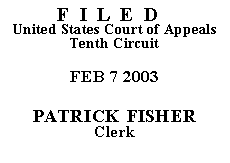

| UNITED STATES OF AMERICA,
Plaintiff - Appellee, v. DOMINGO BARRAZA-RIOS, also known as Domingo Parraza-Rios, also known as Domingo BarrazaRios, Defendant - Appellant. |
CIV-02-383-BB/KBM
|
After examining the briefs and appellate record, this panel has determined unanimously that oral argument would not materially assist the determination of this appeal. See Fed. R. App. P. 34(a)(2); 10th Cir. R. 34.1(G). The case is therefore ordered submitted without oral argument.
Domingo Barraza-Rios appeals pro se from an order denying a motion to modify his sentence under 18 U.S.C. § 3582(c)(2). We affirm.(1)
Mr. Barraza-Rios pled guilty to reentry of a deported alien previously convicted of an aggravated felony for which he was sentenced to a term of 78 months. In his subsequently filed § 3582(c)(2) motion, Mr. Barraza-Rios argued that the sentencing range applicable to his conviction had been lowered retroactively by an amendment to the Sentencing Guidelines. The district court concluded that the amendment, Amendment 632, did not apply retroactively and denied relief.
Under § 3582(c)(2), a district court may reduce a term of imprisonment when the sentencing range has been subsequently lowered by the Sentencing Commission. The Commission has promulgated USSG § 1B1.10 which lists specific amendments that sentencing courts may apply retroactively to reduce a defendant's sentence. Amendment 632 is not a listed amendment. However, even if an amendment is not listed, sentencing courts may still give retroactive effect to amendments which are "clarifying" as opposed to "substantive." United States v. Kissick, 69 F.3d 1048, 1052 (10th Cir. 1995). The factors to be reviewed include "the Commission's characterization of the amendment, whether the amendment changes the text of the guidelines or merely the accompanying commentary, and whether the amendment alters the controlling pre-amendment interpretation of the guideline at issue." Id.
A review of these factors indicates that the amendment is not merely clarifying. The amendment completely rewrote § 2L1.2. The accompanying commentary states that the change was made in response to concerns by judges, probation officers, and defense attorneys that the former guideline resulted in disproportionate penalties. USSG App. C. This certainly may not be considered merely clarifying.
Moreover, even if the amendment were to be applied retroactively, Mr. Barraza-Rios would not benefit. Under the new § 2L1.2 he would receive the same 16-level increase because his prior aggravated felony was a drug trafficking offense for which he received a sentence of more than 13 months. See USSG § 2L1.2(b)(1)(A).
Accordingly, the order of the district court is AFFIRMED. The mandate shall issue forthwith.
Entered for the Court
Circuit Judge
*.This order and judgment is not binding precedent, except under the doctrines of law of the case, res judicata, and collateral estoppel. The court generally disfavors the citation of orders and judgments; nevertheless, an order and judgment may be cited under the terms and conditions of 10th Cir. R. 36.3.
1.The government argues that Mr. Barraza-Rios waived his right to appeal his sentence in the plea agreement. However, the record before this court is not sufficient to determine the validity of the waiver.